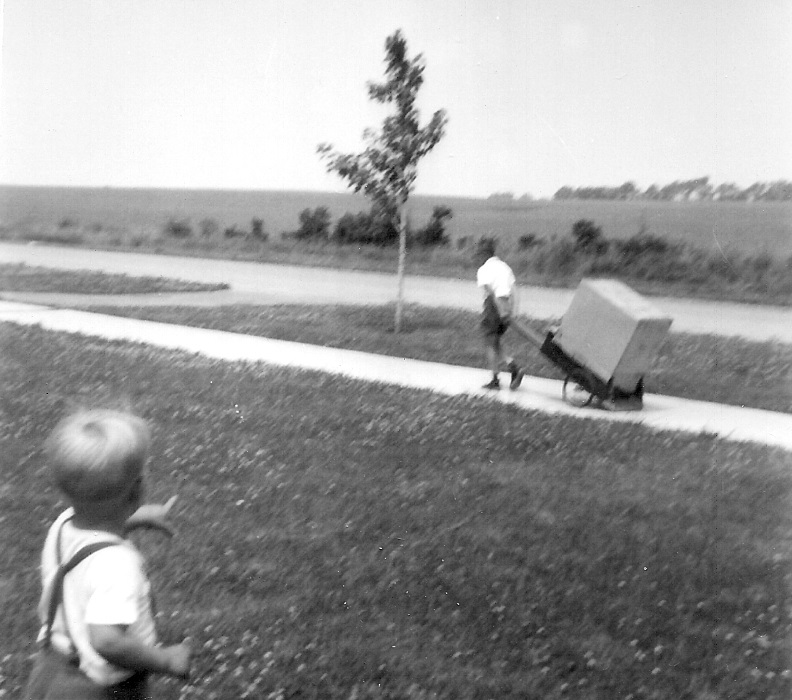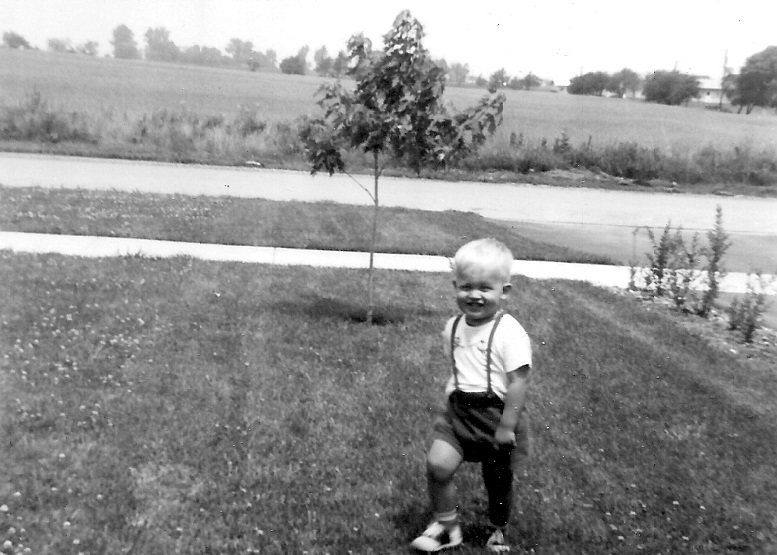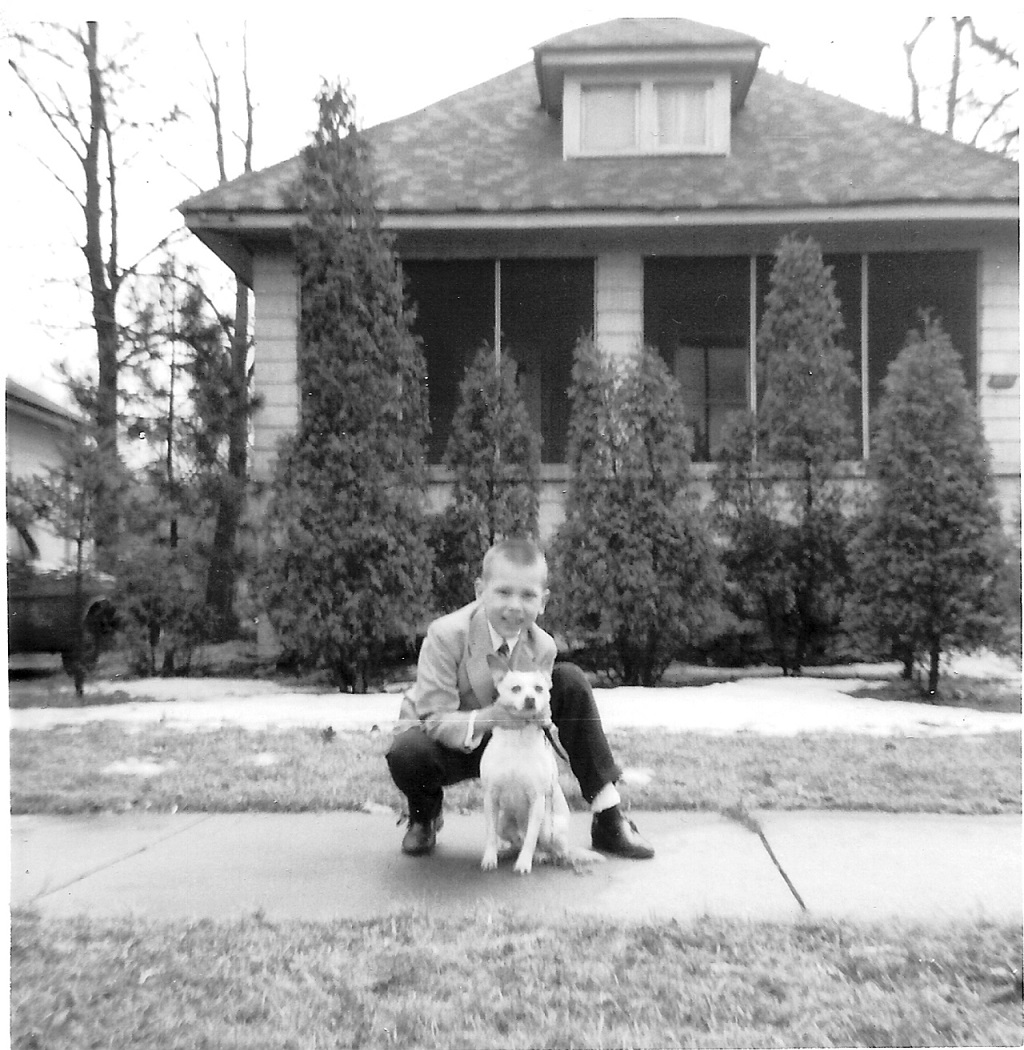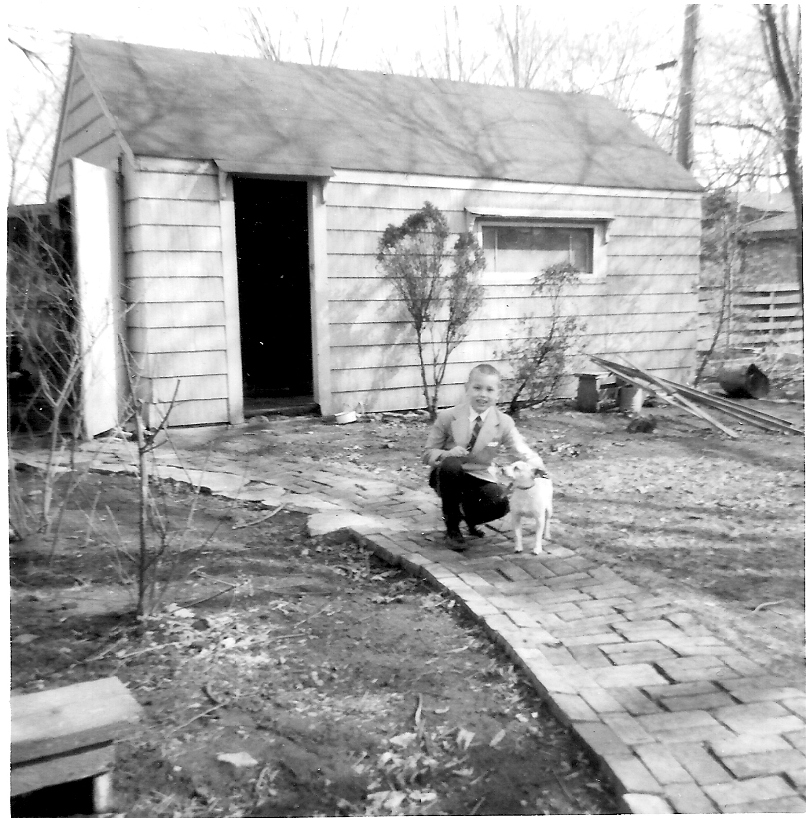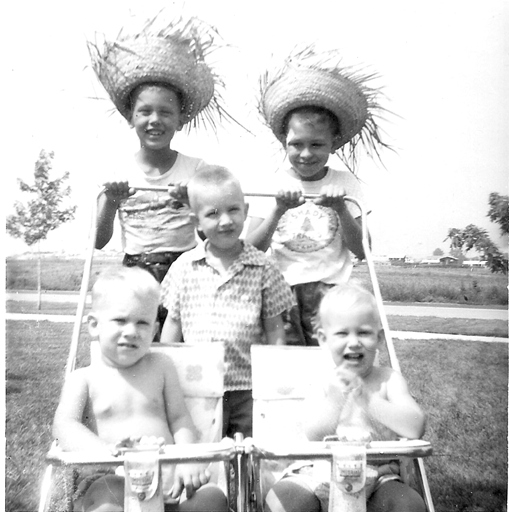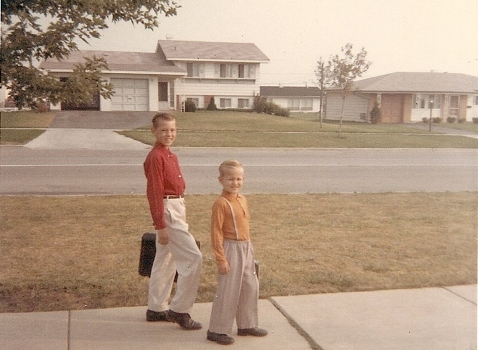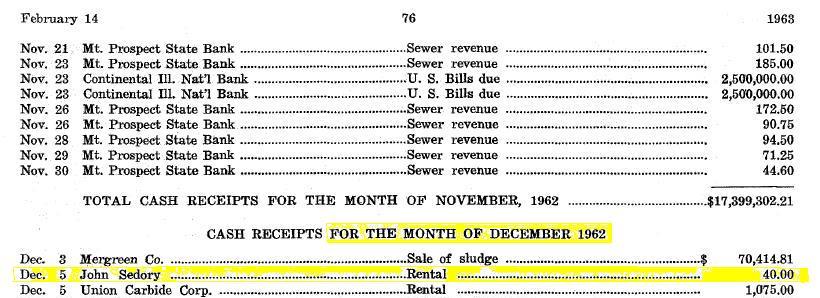Sick, and the Day got worse!
On January 30th, 1959, I'd come down with boils on my legs. This resulted in high fevers and swollen legs, so swollen that I couldn't put shoes on. Eleanor called her father to tell him he'd have to open the store that day because of what happened to me. I was just about delirious from the fever, and I scarcely knew what was going on.
Eleanor had gone to her part time job, and the kids were in school.[1] The phone rang, and it was Eleanor. She told me something I couldn't get through my head.
She said she'd received a call at her place of employment in which she was told to hurry to her father's store, as he'd gotten very ill. Her mother also got the same call at home, and she got a ride there from the church pastor to the store, meeting Eleanor there.
My Father-In-Law!
The pastor had phoned the store before picking my mother-in-law up in order to be better prepared for any eventuality. He then learned that Clarence wasn't "very ill," but he'd been found dead at his desk. And all the way to the store he was preparing my mother-in-law for more than an "illness."
This is what Eleanor passed on to me when she phoned me at home. For she had been at the store first and saw her father with his head over his arm and on the desk. He'd vomited all over the paperwork he was tackling, and his head and face were a purplish-gray color. Eleanor said when she saw him, "That's not my Dad!" What she meant was that she knew he was gone and that his spirit was no longer inside that body, and what she saw was merely the shell in which he'd lived those 58 years.
I pulled myself together to try to comprehend what had taken place, fever and all giving me less than full ability to think properly. I put on some slippers, being unable to put shoes on, and I got in the car and drove to the store. By the time I'd arrived, my father-in-law's body had already been removed to a hospital.
He was in the process of setting up a new store with supplies, and he had merchandise stacked all over the counters and on tables in front of the store. I'd guess he was under pressure because of this, and my not opening the store that day didn't help any.
Later we learned one of our regular customers had come in the store while my father-in-law was up in the back room where the washroom was located. This guy's name was Timmick, I believe, a Chicago cop who visited often. He asked if he could get a bottle of Seven-Up for Clarence, and Clarence told him he was chewing Pepsin gum which always helped when he felt that way. So Timmick left.
Then a customer came in and tried to arouse Clarence and could get no response. So he went out to Menard Avenue and got the crossing cop to come into the store to check things out. It was then they found him dead at his desk, though they did call the equivalent of today's 911 number.
Many times my father-in-law and I had eaten lunch together as he sat at that very desk at which he'd died. Often he'd swing his left arm and complain of "this bursitis." It probably wasn't bursitis at all but clogged arteries all over his body, for the cause of death was listed as a cerebral hemorrhage, "a massive" one at that. He didn't have a second chance at changing diet or having surgery as many of us have had.
I made up a sign advising customers why we weren't open, explaining what had taken place. The funeral plans hadn't yet been made, so I had to come back a day or so later to add that to the note.
When I first arrived at the store and got all the details which were available, and I looked at the pile of merchandise my father-in-law had collected for that new account, and I saw the vomit over the desk, it all hit me at once. I almost choked on the lump in my throat as I tried to fight off tears.
The barber across the street from our store where Clarence and I got all our haircuts (he had gone there a lot more than I had in prior years), when he learned what happened said, "If a guy dies at that young age taking care of himself as Clarence did, I'm no longer going to watch anything I do!" He was referring to the fact my father-in-law was pretty fussy about most everything he did. And besides that, he was a husky looking man of over six feet in height, weighing around 200 pounds or more. But he did have a reddish complexion which always made me wonder if he had high blood pressure.
In conclusion, my father-in-law didn't believe in doctors or in insurance. He'd had experiences where he figured paying for insurance all those years without using it was more costly than just saving money and having it when it was needed. He was also a Lone Ranger buff who seldom missed the programs. Another big thing with him was his love for Cheerios, and his wish each year to leave the Christmas tree up for a month after the holiday was over. It's ironic that the tree was up when he died!
The Mulder Funeral Home in Cicero handled most of the family's funerals, so Clarence, too, was there. It was cold and wintry and snowy at the time. In the adjoining room to where Clarence was laid out was a boy of about five. He had nice blonde hair and was a handsome boy. We learned he'd choked on a marble. That was more tragic than the loss of my father-in-law! To this day I feel squeamish about seeing kids put things into their mouths, things which could also cause a tragedy.
I was glad about the stormy, snowy weather at that time, as it helped to take our minds off Clarence's passing a little and the trip to the cemetery[2] and all the tears which usually follow such an event.
Robert quit his Job at Hotpoint
After I opened the store, I learned Eleanor's brother Robert had convinced his mother that he should be at the store, too. So he quit his job at Hotpoint and joined me there. One of my first and unpleasant tasks was to try making some sense of the paperwork which had by now dried out from the vomit which had splattered on it. And from there I had to try determining if we could handle the business without losing everything Clarence had worked to build.
Robert learned the business well, always having had a knack with mechanical and electrical things. But he began getting ideas about building a big garage in the back of the building, maybe even making it a two story garage and joining it to the back of the building itself.
Then he wanted to consider putting a basement under the building, a three story building which merely had a foundation. To me that idea was more absurd than the garage idea—though I didn't think either was feasible or practical. I just wanted to build the business and keep it going.
David Edgren Born
Betty (Robert's wife) delivered their first child, David, in February of 1959, having been pregnant some time before Clarence died. Of course he never got to see David (born ten or eleven days after Clarence's death).
Grandma Kaske
On August 21, 1959, Eleanor's grandmother (my mother-in-law's mother) died at age 82 [Helen (Klotz) Kaske]. I'd become quite fond of her before her passing, having spoken to her about the Lord and as to whether or not she knew Him as her Lord and Savior. She'd assured me she had.
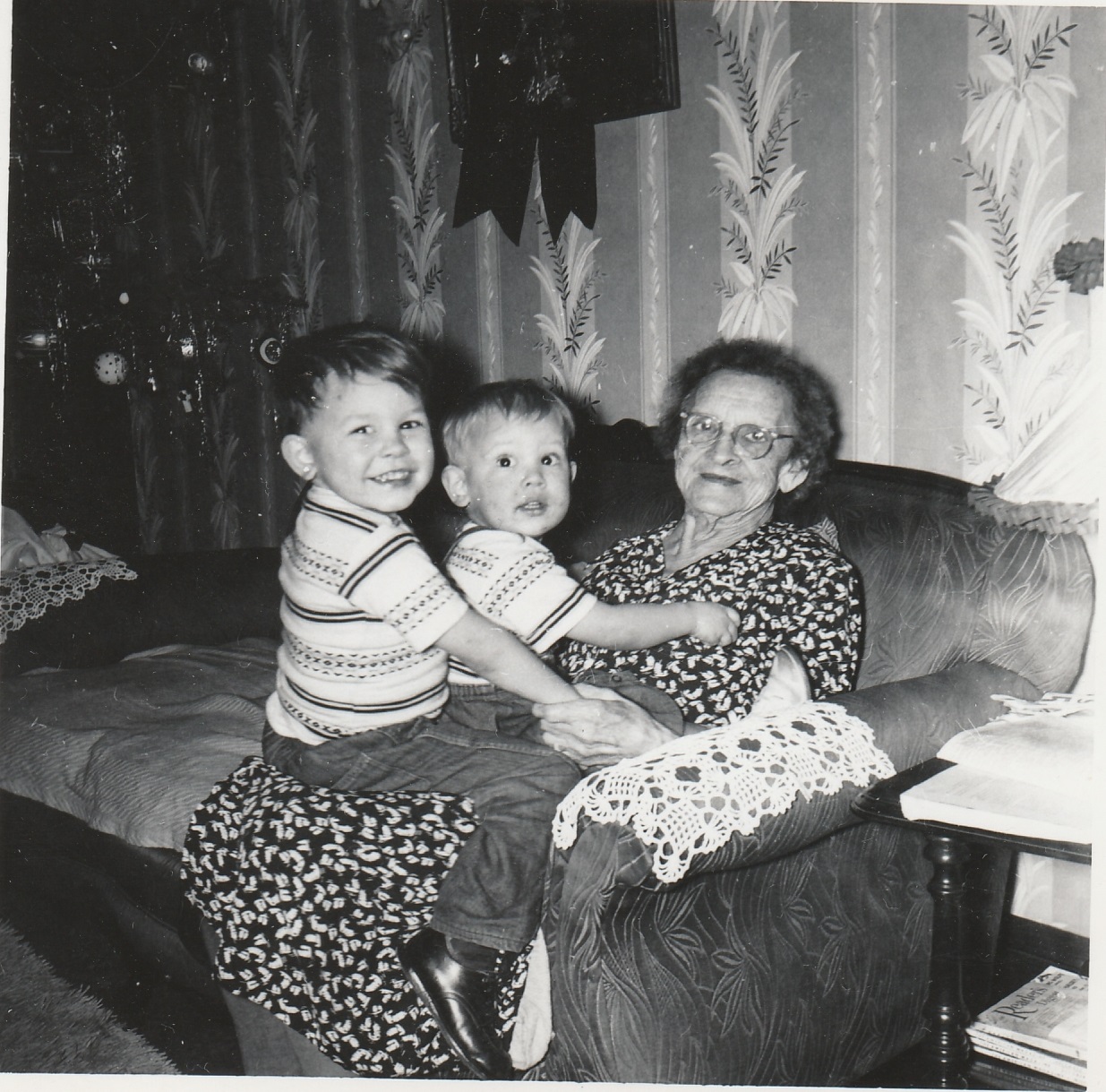 | Christmas, 1955. Daniel (3 yrs old) and Timothy (1-1/2 years old) on Grandma Kaske's lap. |
One of the things I most remember Grandma Kaske for was an expression she used. When asked how the meal was at a given time, if she really liked it, she'd respond, "Not too bad!" She had stomach trouble for some time, and evidently cancer may have been at work in her body long before it was finally detected. And by then it was too late. [After being] in bed for a while, bed sores showed up all over. They would not heal and were very painful. Her last few weeks of life were spent in a coma.
She was the first person I'd ever seen actually taking his/her last breath. One could stand at her bedroom door and watch and hear her gasping for every breath; it was painful to see her [like that]. The day she took that last breath, Erana and I were both staring at her from the bedroom door. We heard what is commonly called the "death rattle." It was pathetic!
Why I left Austin Automotive
In 1959 and into 1960 things were going fairly well, except for hearing from my mother-in-law that "Robert thinks things should be done this or that way," ways I didn't agree with at all. And as we entered 1960 in the spring, I'd almost had all I could take of the double dose of Robert and my mother-in-law. So I looked around for another job.
Remember now, I did all the book work, the ordering, selling outside the store, and trying to make things work out. Many nights were spent at home doing what Clarence had once done—bookwork all night long. And I didn't feel it was going to work out the way Robert wanted to do things.
Started working at Grebel Auto
In time I'd learned that Grebel Auto Specialty was looking for a counter man with some experience, and he was paying a lot more than I earned at Austin Automotive Electric—without having to do any extra book work or anything else. So I applied and got the job. Grebel's was located at Chicago Avenue and Central [at 5517 W. Chicago Ave.], just a mile south of our store and a couple blocks to the east.
Betty came to the store to help Bob after I left, and they worked the business from that time forward. I came into the store one time to collect some chemicals that weren't moving for them, and these were to take the place of a vacation I had coming. When I moved to go behind the counter to get them, Betty advised me I had nothing to do with that store and to stay in front of the counter. Of course a lot of thoughts went through my mind of years I'd spent with my father-in-law helping him build that business, even back from 1947 before Betty ever heard of Bob Edgren or the store. And it hit me like a ton of bricks that here was someone telling me to stay out of the place I'd helped build.
From that time forward, Betty and I had little to do with each other, though in later years we were invited to their home for a dinner and visitation. I'd not seen the kids for some time, (they had four by then) and we did have a good time as I recall.
Also, in January of 1960, Eleanor began babysitting a two year old for one of our neighbors. It was one of the many, many jobs she held all those years to help with expenses.
And in around March of 1960, Eleanor found she was pregnant with our third child, one for whom we'd longed for some time. We'd wondered if perhaps my cells had turned weak again and if we'd ever have another child. So it was a happy time when this pregnancy was certified by her doctor.
At Grebel Auto I soon found my way around, and I enjoyed working there. But from the time I'd left Robert and Betty at Austin Automotive Electric, I felt sorry for them in their struggle to survive the business. I'd wished many times I could have helped them from places I'd worked, but my employers weren't that understanding toward that idea. By "helping," I meant to be able to give them better prices when they needed some part or other.
Also in the CAP
It's strange how, as one progresses through events in his life, other previously forgotten memories come to the fore. I'm thinking now of the Civil Air Patrol at O'Hare Field, Chicago, of which I was a member in 1959 and 1960.
The largest senior squadron in the U.S. (as far as I know) was based there, members probably totaling 100 plus I'd guess. Aircraft privately owned by some of those members totaled something like 50 to 52. In my squadron one fellow owned a hot plane which had a powerful inline engine. It was a Beechcraft Bonanza.[3] In our searches for downed aircraft I got to fly this plane a couple of times, but I at first was not prepared to handle such speed and power.
Having been a small aircraft private pilot, the Bonanza was like a jet in comparison. When we flew our assigned coordinates (patterns for each crew to cover certain areas in a search for downed aircraft) and I'd be given the controls, it was something else.
I'd begin the bank and turn at each end of the pattern as though I were in an air race, putting the wings into an almost vertical position and revving the engine as I did it. Everything takes time, and I eventually got the idea that such steep turns and banks weren't necessary. The other three in the plane would hold on for dear life as I made such turns.
A fellow named Bill Luchitz, an auto mechanics instructor at a high school, had a WWII trainer plane, a BT-13 if I'm not mistaken. He rented a tiedown space at O'Hare and was also a member of my squadron. He often came into our auto parts store, as he was quite mechanically inclined and worked on cars as well as on his own aircraft. One time he invited me out to go flying with him and gave me the controls. That plane was the sweetest, softest craft I'd ever flown. It needed hardly any control movement on the stick and wasn't the least bit harsh. It was one of the most "forgiving" planes I'd known, too. By that I mean it was not apt to easily stall or to go into spins.
Flying the plane was easy, but listening in on the tower frequency over the radio in the plane almost blew me out of my seat. I didn't know how Bill could figure out what the control tower guys were telling him. There must have been a dozen or more conversations going at the same time. But Bill was familiar with such pandemonium, and he picked out his call number and received his instructions, acknowledging them for when and where to land.
Another function of the C.A.P. was its preparation to handle calamities such as nuclear fallout. Certain geographical areas would be planted with radioactive materials, and we'd go through those areas with our equipment to measure the intensity and location of those sources. We wore patches which registered these values or intensities to which we'd been exposed personally. That measure was done in what is called "roentgens," an internationally accepted measuring system of those x-rays and gamma rays.
The purpose of the patch was to determine the individual's accumulated total number of roentgens, as there is a calculated total at which he could be in danger of overexposure which could lead to cancer-producing cells. This is the inordinate reproduction or growth of body tissue or cells. The idea of wearing the patches served as a guide for what amount of material to bury for our searches and to make certain each man's suit sufficiently resisted those roentgens to which we had been exposed.
Our Move to the 'Burbs
And the Birth of our Third Son (Jack)
In October of 1960 Eleanor was just about ready to have our third child. But wouldn't you know we'd been looking all over to try buying an affordable home? And now we'd found one! It was located in Hoffman Estates, Illinois, a community nearly 30 miles northwest of Chicago (maybe more). We had searched for a long time before that, but now that the delivery time was near, this deal surfaced as if out of the clear blue. I'd have to be ready to move on October 30th to the 31st, and she was hardly in [a] condition for packing and moving.
[With the move approaching], I rushed her to the Berwyn [i.e., the MacNeal (Memorial)] Hospital for what turned out to be a near emergency delivery—it happened so soon after she arrived at the hospital. But this was actually a late arrival, for we previously wondered if the baby would wait until Dad's birthday (my father) on October 24th. This was the one and only son I'd seen before he'd been "cleaned up" after birth, and the blood and redness all over him made me squeamish.
After seeing her and Jack T. and visiting for a time, I went back home to continue packing, as I'd arranged with a few people to help me with the move, and I didn't want to keep them waiting with last minute packing.
We made the move in one truckload on October 30th, and Eleanor brought the baby to her new home and to his first home on November 1st. Maybe it was kind of a reward for Eleanor to be away while all that packing and moving took place, something to compensate for her suffering in delivering our third son.
The home was situated at 290 [now 625 under the new numbering system (since June, 1978)] Bode Road (pronounced bo-dee), one [large] block south of [the intersection of] Higgins and Roselle Roads, then about 3½ blocks to the west. It was to the south of a [huge] farmer's acreage [just the other side of the road], but that would become a new housing area within a few years after we moved in.
[ Editor: These pictures show the view we had of farmers’ fields from our house for the first few years we lived there: ]
